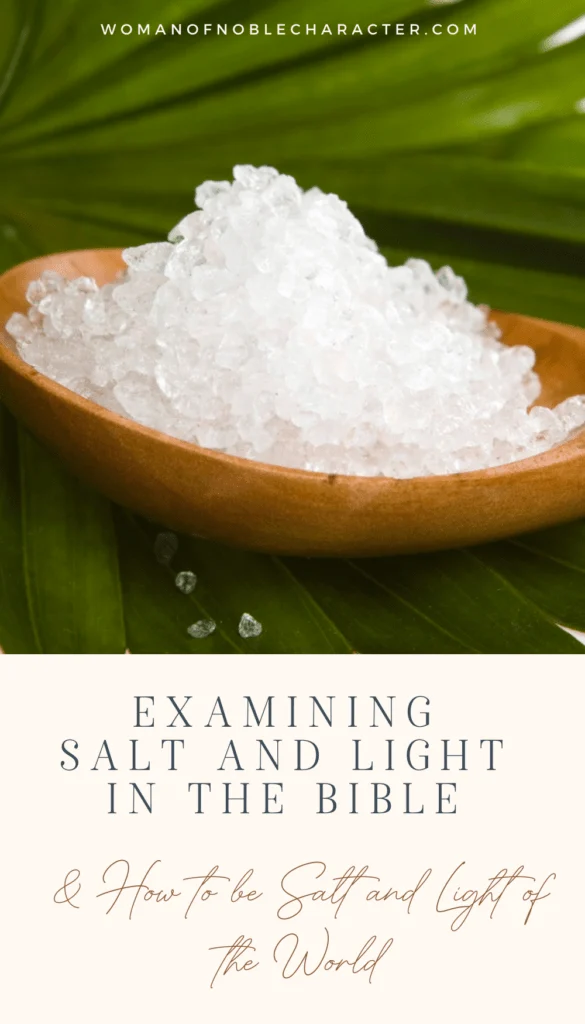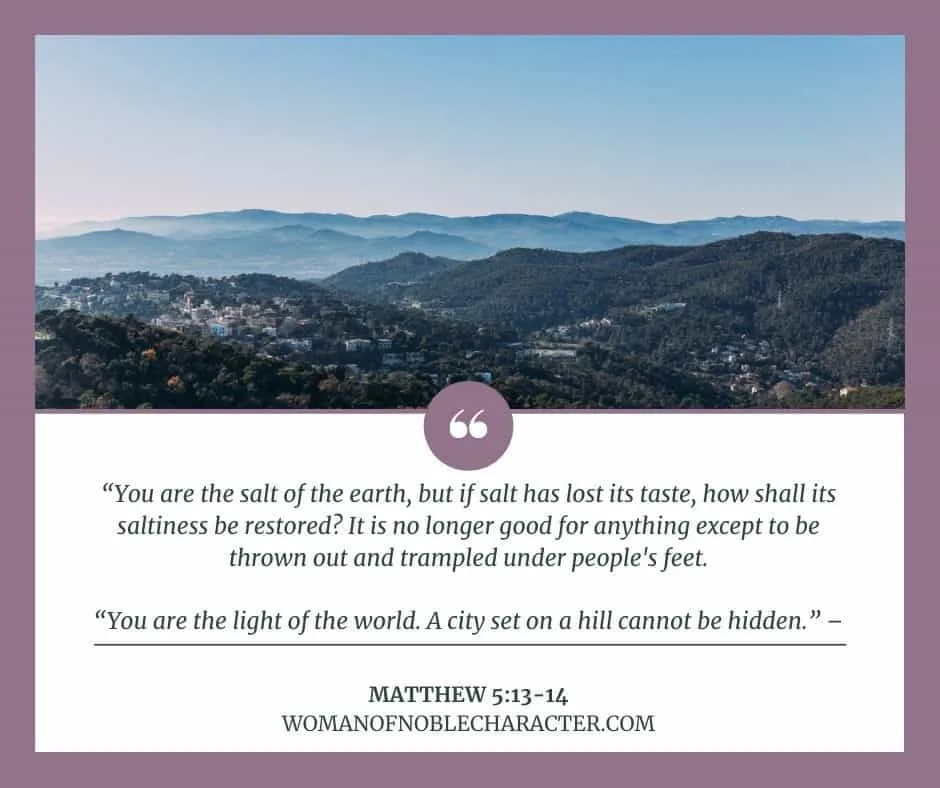This page/post may contain affiliate links. As an Amazon Associate, as well as an affiliate of other programs, this means if you purchase something using these links, I will receive a commission on qualifying purchases at no cost to you! For more detailed information, please visit our Affiliate Disclaimer page
During a sermon or reading your Bible, have you ever wondered what the meaning of salt and light is? Or pondered salt and light in scripture? Perhaps, you’ve wondered how you can be the salt and light of the world.
When it came to teaching people about God’s Word, commands, and how to live, Jesus had a difficult job. He traveled around the Judean countryside and taught complex and abstract ideas to people that were normal every day, and mostly uneducated.
This is why Jesus taught extensively using parables. Parables were easy to understand and share with others. Jesus also taught using metaphors and similes. Again, because these were easier to understand than the complex truths that He was teaching.
During His Sermon on the Mount, Jesus used the metaphor of salt and light to help the audience understand how they are to live out their lives as believers.

Salt and Light of the World: A Deeper Look
Jesus used the concepts of salt and light a number of different times to refer to how His followers should interact in the world. One lesson can be found in Matthew 5:13:
“You are the salt of the earth, but if salt has lost its taste, how shall its saltiness be restored? It is no longer good for anything except to be thrown out and trampled under people’s feet.
Matthew 5:13-14 (ESV)
“You are the light of the world. A city set on a hill cannot be hidden.”
Jesus said we are “the salt of the earth” and “the light of the world.” YOU are salt and light in this world. You have been called by God to bring light in the darkness in His beautiful name through your life, but it is not optional – Jesus said we ARE salt of the earth and light of the world.
He didn’t say, “you can be,” “You might be,” or “You can choose to be.” You must live out these things daily if you want to truly make an impact on those around you. Everyone who has trusted Christ for salvation and is born again is the salt of the earth and the light of the world.
Let’s take a deep look at the Salt and light scripture and what it means to be salt and light of the world.
The metaphors of salt and light specifically addressed the impact faithful believers should have in this world. They should shine, preserve and add flavor. Like both salt and light, our fellowship with God should have a clear impact on everyone who comes in contact with us.
Jesus isn’t just calling us to be devoted as believers; He’s encouraging us to have an influence everywhere we go.
Salt was used then, as now, as a flavor enhancer. In the same way that salt enhances the flavor of the food, it is added to, followers of Christ stand out as those who “enhance” the flavor of life in this world. Christians, living under the guidance of the Holy Spirit and in obedience to Christ, will inevitably influence the world for good, as salt positively influences the flavor of the food it seasons. Love is the answer, even when everything else seems wrong.
We must be peacemakers and show compassion in times of strife, sorrow, or hatred by binding up wounds caused by these emotions – just as Christ did for us!
But love your enemies, and do good, and lend, expecting nothing in return, and your reward will be great, and you will be sons of the Most High, for he is kind to the ungrateful and the evil.
Luke 6:35 (ESV)
Our Savior calls His disciples the “salt of the earth” and the “light of the world.” These two items are to preserve and transform food, and darkness. Like salt and light, the church is to have a transformative effect on the world. WE are to be the salt and light of the world.
Salt of the Earth
Salt – alas – ἅλας (Greek) – transliteration: hals
In biblical times, salt was highly valued. In fact, Roman soldiers received their wages in salt, and Mosaic Law commanded that all grain offerings presented to God by the Israelites be salted.
You shall season all your grain offerings with salt. You shall not let the salt of the covenant with your God be missing from your grain offering; with all your offerings you shall offer salt.
Leviticus 2:13 (ESV)
When Jesus said to his disciples that they were to be “the salt of the earth”, this was something they understood. Even though salt is no longer a valuable commodity, this command from Jesus is still as relevant today as it was when He first spoke it.

What are the characteristics of salt that led Jesus to use it in this context?
Biblical scholars don’t agree on the meaning of “salt” in Matthew 5:13. Some believe that the whiteness of the salt represents the purity of the righteous believer. Others believe that the flavoring properties of salt represent that Christians are to add flavor to the world. Yet, others are of the opinion that Christians are to “sting” the world with rebuke and judgment, in the same way, that pouring salt on an open wound would sting. And, still, other theologians believe that as salt, we are to create a thirst for God’s Word and Christ.
Finally, some assert that salt represents stopping decay. For example, as “salt of the earth,” believers were to act as preservatives, stopping moral decay in a fallen world.
Without refrigeration, (which we know was not yet invented when Jesus walked the earth), fish that was caught would quickly spoil and rot unless it was packed in salt. However, once salted, the fish could be safely stored and then eaten, when needed.
The spiritual health and strength of the believer are to thwart the corruption and sin in our world. Christians, as salt, are to work to stop sin’s power to destroy lives. This, will, in turn, create an opportunity for the gospel to be shared with others.
Christians are to be like salt and have a positive impact on their neighborhoods and society.
Overall, the meaning of salt in Jesus’ metaphor is most likely not limited to any single benefit we get from the substance. But, it is important to note that we are salt only if we maintain our difference from the world around us.
We have been given the incredible privilege to be the salt of the earth, but Jesus also cautioned us. The second part of Matthew 5:13 warns:
“but if salt has lost its taste, how shall its saltiness be restored? It is no longer good for anything except to be thrown out and trampled under people’s feet.”
Matthew 5:13 (ESV)
Jesus didn’t say that we can lose our salvation; He said that we can lose our saltiness. When salt is contaminated, it becomes corrosive and poisonous. Contaminated salt cannot even be used for fertilizer on the field, so it has to be thrown on the road. If we have allowed sin, indifference, or disobedience in our lives, we will become contaminated salt and will have lost our saltiness. We need to confess our sins and let God restore us to the purpose for which He called us.
In Mark 9:50, we see that we can lose our saltiness if we are not at peace with one another.
“Salt is good, but if the salt has lost its saltiness, how will you make it salty again? Have salt in yourselves, and be at peace with one another.”
Mark 9:50 (ESV)
We also see, in Luke 14:34-25, another reference to salt. This one, when you read the surrounding verses, shows that it refers to obedient discipleship. The loss of saltiness will occur if the believer fails to follow Jesus wholeheartedly.
“Salt is good, but if salt has lost its taste, how shall its saltiness be restored? It is of no use either for the soil or for the manure pile. It is thrown away. He who has ears to hear, let him hear.”
Luke 14:34-35
I love this song, Salt and Light by Lauren Daigle.
Light of the World
Light – phos – φῶς (Greek) – transliteration – phainó
“You are the light of the world. A city set on a hill cannot be hidden. Nor do people light a lamp and put it under a basket, but on a stand, and it gives light to all in the house. In the same way, let your light shine before others, so that they may see your good works and give glory to your Father who is in heaven.”
Matthew 5:14-16 (ESV)
The people in the rural areas, such as the one Jesus was addressing in Matthew 5, know how blinding darkness can be. However, the glow of a city in the distance can give those who are in the dark of night a sense of direction and even hope. Just as walking around the dark camp area at night is dangerous without a lighted torch, Jesus calls us to be the light of the world, to live as those transformed by the Spirit so that the world will take notice and be led to glorify the Father.
Since most of us have never lived without the convenience of electric light, we might miss Jesus’ point here. If we walk into a dark room, we simply flip the light switch, and the room is illuminated. During biblical times, however, this wasn’t the case. They lit their homes at night with small oil lamps.
When Jesus spoke of lighting a lamp and putting it under a clay pot, the crowd would have possibly laughed but certainly would have understood what Jesus was conveying.
The implication was clear. Our faithfulness should be evident to all. The behavior of God’s people should be a light that draws others to it. Outsiders should be drawn to praise God when they see how we are living like Jesus and loving others as He did.
Light is a symbol used to mean knowledge, understanding, and awareness. To ‘be light’ means to be a witness to others about the truth of God’s Word, who Christ is, and how he died and rose again for our salvation.

In the metaphor of us being a light to the world, the good works of Christ’s followers are to shine for all to see. The presence of Christians in the world must be like a light in the darkness, not only in the sense that the truth of God’s Word brings light to the darkened hearts of sinful man but in how we live our lives and model Christ for others to see.
In the beginning was the Word, and the Word was with God, and the Word was God. He was in the beginning with God. All things were made through him, and without him was not any thing made that was made. In him was life, and the life was the light of men. The light shines in the darkness, and the darkness has not overcome it.
John 1-10 (ESV)
There was a man sent from God, whose name was John. He came as a witness, to bear witness about the light, that all might believe through him. He was not the light, but came to bear witness about the light.
The true light, which gives light to everyone, was coming into the world. He was in the world, and the world was made through him, yet the world did not know him.
We also see, in Philippians 2:15, Paul says:
“that you may be blameless and innocent, children of God without blemish in the midst of a crooked and twisted generation, among whom you shine as lights in the world,”
Philippians 2:15 (ESV) (italics, mine)
When we look at the end of this verse, “among whom you shine as lights in the world”, the Greek word used for lights is similar to the word used for the beacon that a lighthouse emanates. That beacon of light is bright and unmistakable. It warns of danger. It directs ships to safe harbor. It provides hope for those who are lost. Every day we come in contact with people who are lost. In darkness. In bondage. Separated from God. It is our role, as believers, to be beacons of light and direct others to the Father.
Be Salt and Light in the World
To summarize what we read in Matthew 5:13-14, Jesus tells His disciples to be the salt of the earth and light of the world. As “salt”, we, the believer, are to counteract the power of sin. As “light,” we are to illuminate or make visible. Our lives are to be a daily witness to the realness of Christ’s presence and power in our lives. When we worship God fully, when we love others as Jesus does, and when we perform good work without growing weary, we are shining light. It is important, however, to realize that it is not our light, but the reflection of Jesus Himself, that people will see in us.
Jesus said that we are to be the salt and light of the world. He didn’t say that we could be one or the other, or we could choose not to. He said we ARE. Everyone who has been saved by faith in Jesus is born again and is the salt of the earth and the light of the world.
Our role as salt and light can be broken or tarnished by our choices. Through sin. Through convenience. Or, through anything that would not be pleasing to God.
Once you are saved, and the Holy Spirit comes upon you, being the salt and light of the world is something that will occur through obedience to God. It is when we depart from the Spirit-led lifestyle of genuine discipleship that the distinctions between ourselves and the rest of the world become blurred, and our testimony is hindered. Only by remaining focused on Christ and being obedient to Him can we expect to remain salt and light in the world.
You may enjoy this sermon by David Guzik’s about the Sermon on the Mount, looking at what Jesus meant when He called His followers to be the salt and light of the world.
You may also enjoy one of these recommended books, resources or devotionals on salt and light meaning:
The One Year Salt and Light Devotional: 365 Inspirations to Equip and Encourage You to Live Out Your Calling in the World by Chris Tiegreen
Living as Salt and Light: God’s Call to Transform Your World by Derek Prince
How can you be the salt and light of the world? What do salt and light mean to you as you read scripture?
Because of Him,
Sue
